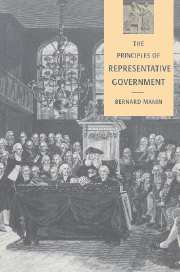Book contents
3 - The principle of distinction
Published online by Cambridge University Press: 08 March 2010
Summary
As we have seen, the founders of representative government were not concerned that elections might result in an inegalitarian distribution of offices; their attention was concentrated on the equal right to consent that this method made possible. Another inegalitarian characteristic of representative government, however, was deliberately introduced after extensive discussion, namely that the representatives be socially superior to those who elect them. Elected representatives, it was firmly believed, should rank higher than most of their constituents in wealth, talent, and virtue. The fraction of the population constituting the electorate varied from country to country at the time representative government was established. For example, in England only the upper strata of the society could vote, whereas in the United States and in revolutionary France the right to vote extended to more popular elements. But whatever the threshold was, measures were taken to ensure that representatives were well above it. What counted was not only the social status of representatives defined in absolute terms, but also (and possibly more importantly) their status relative to that of their electors. Representative government was instituted in full awareness that elected representatives would and should be distinguished citizens, socially different from those who elected them. We shall call this the “principle of distinction.”
The non-democratic nature of representative government in its early days is usually seen to lie in the restricted character of the electoral franchise. In post-civil war England the right to vote was indeed reserved to a small fraction of the population.
- Type
- Chapter
- Information
- The Principles of Representative Government , pp. 94 - 131Publisher: Cambridge University PressPrint publication year: 1997

